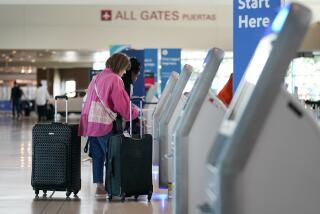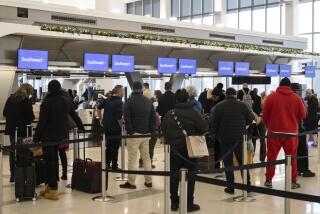U.S. Smoking Ban on Many Air Flights Urged
WASHINGTON — Congressional advocates of anti-smoking legislation, vowing to overcome the influence of the tobacco lobby, pledged Wednesday to take action this year to ban smoking on many commercial airline flights.
Testifying before a House subcommittee, the legislators argued that passage of the new California law banning smoking on intrastate flights there suggests that the time for federal legislation is long overdue.
“If Congress doesn’t act, we’re going to have increasing numbers of states acting to ban smoking within a state,” said Rep. James L. Oberstar (D-Minn.), sponsor of one of six airline anti-smoking bills before the House. “That’s not good public policy, that’s not good national policy.”
In June the House approved a measure that would ban smoking on flights of two hours or less and a similar measure is expected to reach the Senate floor next week. But opposition is expected to be strong, particularly from senators who represent tobacco-producing states.
“The Tobacco Institute got caught with their pants down on the House side,” said one Senate aide, referring to the tobacco industry’s principal lobbying group. “This time they’ll make sure it doesn’t happen again.”
The legislative tussle over federal airline no-smoking legislation is of particular relevance to California, where airline industry officials have declared that flights will not be bound by the new state law, which goes into effect Jan. 1. They contend that only the federal government can regulate the airlines.
Although the House has approved the smoking ban on shorter flights, five other bills have been introduced that would ban smoking on all domestic passenger flights. The House aviation subcommittee heard testimony about those bills in an effort to find “good, workable ways” to address the issue, said Rep. Norman Y. Mineta (D-San Jose), the subcommittee chairman.
Both Rep. Richard J. Durbin (D-Ill.) and Sen. Frank R. Lautenberg (D-N.J.), sponsors of the House and Senate measures banning smoking only on short flights, testified that they would prefer a total ban on smoking aboard airliners, but had compromised to build support. “I didn’t want to lose on the floor,” said Durbin.
The National Academy of Sciences, in an August, 1986, report, recommended that smoking be banned on all domestic commercial flights for reasons of health and safety, but the Department of Transportation argued in its February, 1987, response that further study was needed before a decision could be made.
That debate was repeated in testimony Wednesday, as anti-smoking groups called for an immediate smoking ban, citing what they called indisputable evidence that second-hand smoke is hazardous, while spokesmen for the Tobacco Institute said that more research is needed on the effects of smoke on airline passengers.
More to Read
Sign up for Essential California
The most important California stories and recommendations in your inbox every morning.
You may occasionally receive promotional content from the Los Angeles Times.










